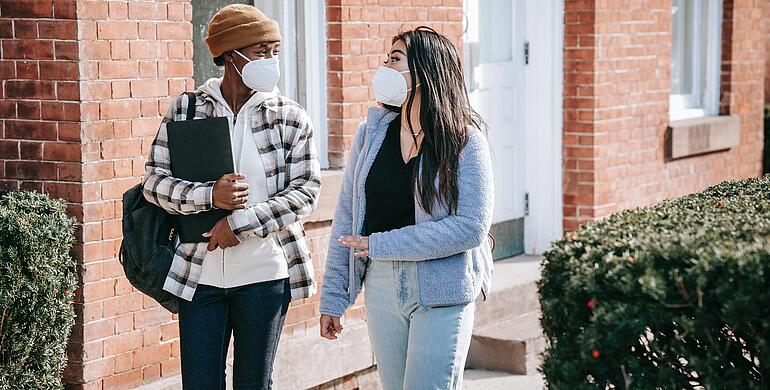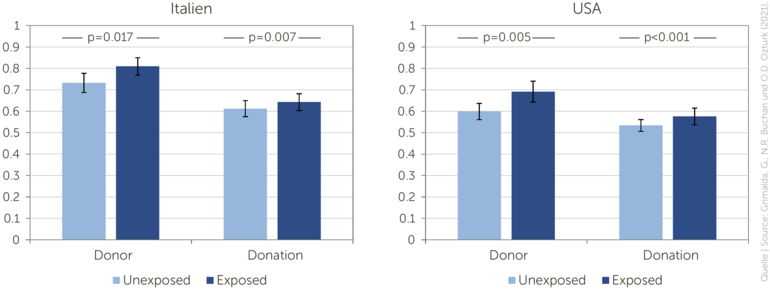Kiel Institute Highlights
Covid-19 Pandemic - Personal Affectedness increases willingness to donate to Charity
People who had themselves contracted COVID-19 or been very directly affected by the pandemic through friends and family were more likely to donate to charities and to give larger amounts than people who had not been affected in such a personal way. In doing so, donors favored local or regional organizations over national or global ones. Those were the key findings of our empirical study with participants from the U.S. and Italy in May and June 2020.

Donating to charity is the quintessential altruistic action. The individual gives up resources to help people they do not know. Altruism, according to a common thesis, is induced in individuals by a threat to the community and a possible general scarcity of resources. This fits the circumstances surrounding the COVID-19 pandemic, at least temporarily. It is consistent with this, for example, that donations in the U.S. increased by 3.8 percent in 2020 to a record USD 471 bn. In addition to donations, citizens also demonstrated their generosity by volunteering or supporting local businesses.
This behavior shows that many people had a heightened sense of community during the pandemic: “We’re all in this together.” Finding out who is actually part of this “we” was a key motivation for our study, which we conducted with more than 900 adults in the United States in May 2020 and repeated with more than 700 adults in Italy in June of the same year (in both cases as an online study). Are people willing to donate in this crisis? And who do they want to help?
Donation experiment: Are people willing to donate unexpected money?
Our team told participants they would be paid USD 3 to take a survey regarding their experiences and decision-making during the COVID-19 pandemic. Afterwards, we gave them a USD 5 bonus and asked if they wanted to donate some or all of the bonus to charities supporting COVID-19 relief in their state or region, their own country, or around the world. Italians got EUR 2.50 as the base payment for participating and EUR 4 as a bonus. We told participants we would match any amount they donated.
We found that people in the U.S. who were more directly affected by the COVID-19 pandemic were 9 percent more likely to donate than others. They also donated 9.2 percent more money. In Italy, the results were slightly lower but similar (7.5 percent higher likelihood of donating and 5.8 percent more money). About 63 percent of the U.S. participants and 77 percent of the Italian participants gave away at least some of this unexpected money. Overall, people taking part in the study gave away 35 percent of their bonus and kept 65 percent for themselves. Nearly 20 percent gave away their entire bonus.
These initial findings suggested that having COVID-19 or experiencing its effects firsthand through friends and relatives makes the reality of the pandemic and the need for charitable action more apparent. No evidence of environmental exposure to the disease having a significant impact on altruistic behavior was found when we measured the actual number of cases in the participant’s area. This suggests that subjective psychological construal of the crisis is somehow independent of the “objective” threat faced by people in their area of residence and that direct personal exposure acts as a factor to activate prosocial behavior.
Impact of personal exposure to COVID-19 on frequency of donations and amount donated

“Donor” is a dichotomous variable taking value of 1 if a participant donated a positive sum to a charity, and 0 otherwise. “Donation” is the amount donated, as a share of the bonus available for donation. The two panels report the means of the two variables, broken down by participants personally unexposed and exposed to COVID-19 in U.S. and Italy. Participants were identified as “Exposed” if they, their family members, or their acquaintances, had been diagnosed with or the latter had died from COVID-19. Unexposed participants were all others.
Who benefits from generosity in a crisis?
In addition to simple willingness to donate, we also wanted to find out who the people donating wanted to help. Here, we built on existing evidence that people are most likely to be interested in things that directly affect their own interests or help their local communities—even when it comes to global crises. Our results confirmed this. In both countries, most participants gave to the charity at the most local level, i.e., the state in the U.S. (41 percent) and the region of residence in Italy (32.9 percent). In Italy, national (26.6 percent) and global (17.4 percent) charities enjoyed slightly greater popularity than in the U.S. (national 13 percent and global 9.33 percent). The strong focus on the local region confirmed the aforementioned thesis from previous research: when people donate, they prefer to support their own communities, particularly during pandemics.
We explain the differences between the countries partly by the fact that responsibility for crisis management was also different. Whereas in the U.S., action was essentially taken by the respective state, in Italy, much was handled at the national level, thus also strengthening the national sense of belonging.
Interestingly, in both countries, those who chose a global charity donated more money. Again, there are results from previous research showing that people with a cosmopolitan attitude are more generous overall than others.
Is this another reason why international cooperation is so difficult?
Although we cannot draw direct policy implications from the present study, we believe that the evidence provided could inform the policy debate in several directions. While our study indicates the existence of a substantial number of people willing to contribute to the common good, the largest proportion of resources are still kept for themselves or the local community. Many global leaders have lamented the current failure of multilateral governance in addressing the spread of COVID-19, let alone facing up to other global challenges affecting our planet.
Our findings suggest that whatever global effort is launched to address the current crisis and other ongoing worldwide crises, it will have to take account of the markedly parochial character of prosocial behavior observed in our study.
Related Publication
References:
Grimalda, G., N.R. Buchan und O.D. Ozturk (2021). Exposure to COVID-19 Is Associated With Increased Altruism, Particularly at the Local Level. Sci Rep (11) 18950. doi.org/10.1038/s41598-021-97234-2